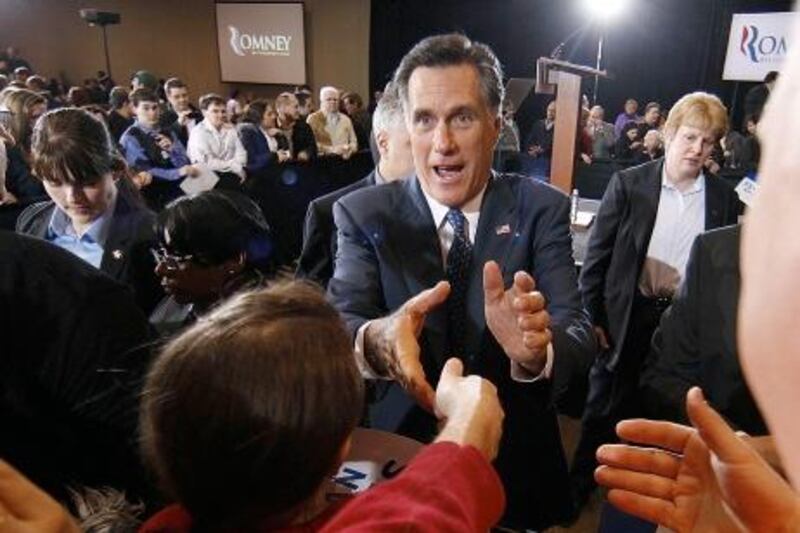WASHINGTON // Mitt Romney may have won two Republican presidential primaries this week, but the former governor of Massachusetts is still not certain to be the party’s candidate to challenge Barack Obama for the US presidency in November.
Mr Romney had to win Michigan – the state in which he was born and where his father served as governor because Republican leaders had started talking about finding a late replacement to enter the race and garner the moderate vote.
Such talk is likely to abate now. Mr Romney seems to have cemented his position as the party establishment’s candidate of choice with his victories in Arizona and Michigan. That there was doubt that he might win his home state still makes him vulnerable, said Bryon Allen, a Washington-based Republican pollster.
“Romney had to win Michigan, or real questions would have been raised,” Mr Allen said.
But Tuesday’s results have not made the picture clearer, he said.
“It’s the story of the campaign so far. You wake up in the morning [after a race] and there is still a lot of fuzziness.”
The focus now turns to next week’s “Super Tuesday”, when 10 states cast their votes and 437 delegates out of the 1,144 a candidate must win to secure the nomination are up for grabs. All four remaining candidates – Ron Paul, Newt Gingrich, Rick Santorum as well as Mr Romney – continue to slug it out.
Mr Romney is polling ahead in four of the states, but is locked in a fierce battle in Ohio with Mr Santorum, the former Pennsylvania senator who has emerged as Mr Romney’s closest rival.
Ohio is a key battleground in the primaries where its mixed demographics test a candidate’s wider appeal.
Mr Romney, a multi-millionaire, has failed to excite lower-income Republicans, a growing demographic for the party. Mr Santorum, whose blue-collar credentials are stronger, garnered a significant majority among Republicans with incomes of less than US$100,000 (Dh367,330) in Michigan, a fact that should stand him in good stead in Ohio.
The Michigan race, however, also raised questions about Mr Santorum’s candidacy. He is campaigning as a social conservative and won three primaries in February, propelling him ahead of Mr Gingrich, the former leader of the House of Representatives, as the main challenger to Mr Romney.
But his strength among conservative and religious voters is also a weakness. With staunchly conservative positions on abortion, women’s issues and gay rights, he is widely considered unable to seriously challenge Mr Obama in a general election, a perception that in part explained why 10 per cent of his support in Michigan came from Democrats eager to promote what they see as the weaker candidate.
Mr Gingrich leads his home state of Georgia, the state with the most delegates, 76 , at stake. Mr Santorum leads Ohio, the second largest, 66, and Mr Romney seems set to take four of the smaller states in play.
Mr Paul, the Texas congressman, is the only candidate without a win, but he takes a steady percentage in every race he contests and seems content to collect delegates right up until the Republican convention in August, with which he might influence the party’s eventual platform.
The race so far had been about “surviving until Super Tuesday”, Mr Allen said. But there is still “a long way to the finish line”, and Mr Romney’s greater financial clout is likely to prove telling in the end.
Mr Allen rejected the suggestion, however, that an expensive and protracted Republican primary race would exhaust donors and dent Republican chances in the autumn.
“There’s a lot of money out there to beat Obama,” Mr Allen said, predicting a presidential race with “more money than anything we’ve seen yet”.
okarmi@thenational.ae






